

A director returns, after several years and more than one lackluster attempt with other kinds of movies, to a genre he redefined. He had some little known but modestly successful works before his big breakthrough, but since then he just has not been the same man who gave us such an epic, fantastic spectacle full of industry-defining special effects, wonderful music, thrilling action, and, above all, a new world to explore with characters we wanted to accompany. Special effects have come a ways since his magnum opus was crafted, and if used correctly they have the potential to enhance the visual experience even more than before. What could possibly go wrong?
Peter Jackson’s latest project is out in theaters. I wish I could say it was called The Hobbit, but honesty compels me to report that the name is actually The Hobbit: An Unexpected Journey. The reason for the alteration is that The Hobbit will be brought to us not as a short adventure thrill ride, in keeping with the pace and feel of the source material, but rather will be extended into a movie trilogy that, when finished, will outlast a typical BBC miniseries. The motive behind this sort of reverse editing, whereby Tolkien’s notes were raided for things to stuff into the story and plump it up, is Mr. Jackson’s belief that we are stupid enough to triple his box office take if he triples the number of movies to be made from the story. He is probably right. I know I bought my ticket.
Even with his triumphs Jackson had a tendency to let a project get bloated. The best example, I believe, is the sudden barrage of scenes that hit us in The Two Towers right as we should be, could be, would be cruising toward the third act if a drawn-out and apocryphal love story were not fed to us by way of flashbacks, many in a languid, dreamy style that makes one wonder if one has just witnessed something shot wholly in slow motion. When Jackson had over 1,000 pages of material to convert to nine hours of footage this was an annoyance. With The Hobbit, he has fewer than 300 pages to make into nine hours and the filler has now surpassed the beef in the hotdog.
[continue reading…]
Help Promote Prometheus Unbound by Sharing this Post
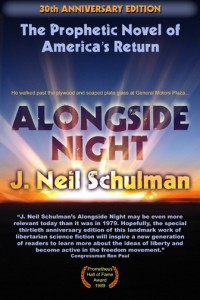
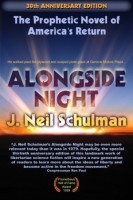
The date has been set for our live author chat with J. Neil Schulman, whose Prometheus Hall of Fame Award–winning novel Alongside Night is being adapted into a film starring Kevin Sorbo (Hercules, Andromeda).
The event will take place via Google+ Hangout on Air on Saturday, November 10th at 9PM EST (that’s 6PM PST / 8PM CST). It will be streamed live for those who cannot fit into the Hangout and a recording will be uploaded to our YouTube channel afterward. For more details, and to RSVP, visit the official event page on Google+.
Here are the official movie trailer, music video, and Schulman’s talk at Libertopia about bringing the book to film:
[continue reading…]
Help Promote Prometheus Unbound by Sharing this Post
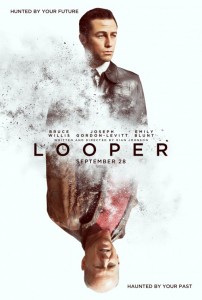

Logic is never kind to a story about time travel. It seems that no matter what idea or aspect of so-called fourth dimensional travel a storyteller wishes to pursue, something does not work right — contradictions abound. The biggest plot holes in the history of fiction are to be found therein. For my money, this is the first and best reason to suppose that time travel is not possible. Reality is nothing if not possible and plausible — at least from the perspective of one in possession of the relevant facts — and if a story cannot be made to work right when time travel is involved, reality probably cannot either.
There is, however, a lot of potential in such tales. If a viewer will but suspend his disbelief and allow an author or filmmaker to explore one possibility while forgetting its necessary and contradictory corollaries, then some interesting possibilities may be realized. Rian Johnson has done a first-rate job of spinning a time-traveling yarn with the new movie Looper, if the audience will afford it such consideration.
The year is 2044, and time travel, as we are told by the narrator and protagonist (played by Joseph Gordon-Levitt), is not yet invented. Thirty years in the future, it is/will be (it occurs to me that we need another tense or two in the English language when we discuss these things). It is illegal, though, and only mobsters make use of it, to send back their targets to be eliminated and their bodies disposed of. The men who do the eliminating and disposing are called loopers, and they earn that appellation when they close their own loop by, at the end of their contract, killing their 30-years-older selves.
Our protagonist, called simply Joe, is a drug abusing, well-dressed looper with a manner perhaps a bit too refined, and a face perhaps too smooth and handsome, for someone in his station. Leonardo DiCaprio, in The Departed, managed to overcome his golden beauty and give a convincing portrayal of a hoodlum. I would have preferred something rougher like that in Looper. Gordon-Levitt has all the makings of a leading man, but I thought the role he portrayed in this film was not quite the right one.
[continue reading…]
Help Promote Prometheus Unbound by Sharing this Post


The Hollywood Movie Factory has turned out another flick, helping to satiate the demand for competent but uninspired action vehicles conveniently forgettable enough not to take up valuable cerebral RAM for the long-term. This one is called Dredd 3D and is based on the same source material that spawned the Stallone production some years ago. I hardly remember the previous version, and I fully expect to have difficulties recalling the present one when, in a decade or two, they remake it. More interesting than the movie, however, are all the libertarian points it makes without any indication that it means to.
In the future, the United States has become an irradiated wasteland, save for a megacity that stretches from old Boston to old DC. A place of squalor and, one suspects based on general living conditions, a robust welfare state, 800 million inhabitants huddle together inside its protective walls, trying to eke out an existence while spawning the occasional mutant.
There are gigantic living centers hundreds of stories high where like classes of people are housed. These massive structures have all the hallmarks of government housing, from a disinterested janitorial staff to poorly maintained and infrequently cleaned premises to homeless squatters claiming filthy nooks and crannies. As one would expect, drug lords dominate in these neglected mini-cities.
Judge Dredd, a member of the police/military class, has the legal privilege to apprehend, try, and punish on his own authority. He takes a student out with him for a day, a young woman who cannot manage a passing grade at the academy but whose mutant psychic powers make her highly desirable for the force. In answering a police call, they enter Peach Trees, the name of one of the gigantic living complexes, and arrest a prominent member of a powerful drug gang. The local drug lord, fearing what information her subordinate will give away when he is interrogated, locks down the building and tries to eliminate the judges.
[continue reading…]
Help Promote Prometheus Unbound by Sharing this Post

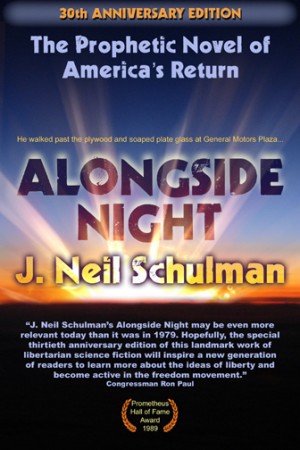
On September 10th at 8 PM EST, Laissez Faire Books will be hosting what I assume is going to be a Q&A-type event on their blog. Wendy McElroy posted the announcement and will be moderating the event. J. Neil Shulman, Prometheus Award–winning author of Alongside Night, and graphic novelist Scott Bieser, will be participating.
The event is meant to celebrate and publicize commencement of the shooting of a movie adaptation of Schulman’s novel. Kevin Sorbo (Hercules, Andromeda, Kull the Conqueror) will star in the movie as Dr. Vreeland. Alongside Night is billed as “a prophetic movie about the economic and social collapse of society. At its core, however, Alongside Night is an optimistic vision of rebellion and the triumph of freedom.”
Head over to the LFB blog for more information and McElroy’s review of the novel. [Update: And her new interview with Schulman.] Come back to read our interview with Schulman.
[continue reading…]
Help Promote Prometheus Unbound by Sharing this Post
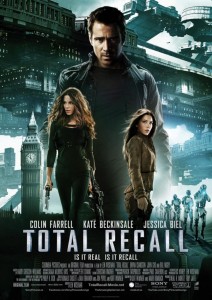
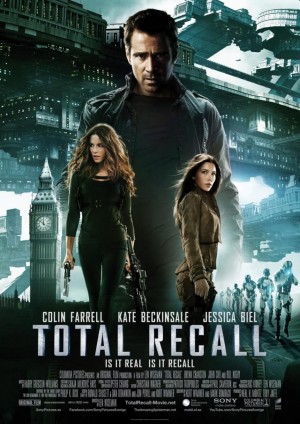
Another movie joins the list of remakes that have, of late, come pouring out of Hollywood. Total Recall has been reimagined for the CGI era, much changed now but sharing just enough plot and details to justify the shared appellation. As I recall, the first Total Recall, starring Arnold Schwarzenegger, was an entertaining bit of science fiction with some action and a satisfying twist or two thrown in. The recent version does not reach the same level, falling short mainly because it invests less in the human element, although it does surpass its predecessor in some areas.
The main characters return with the same names. Colin Farrell plays Douglas Quaid, a blue-collar worker with an itch he does not know how to scratch, a vague sense that something is not right with his life. His wife Lori is played this time by Kate Beckinsale, while the rebel Melina is Jessica Biel. When Quaid goes to Rekall, a company that can insert memories of better times into a client’s brain, they discover that the fake memories of espionage and danger that he is asking for are already in his brain, except that they are real.
Quaid has just a few seconds to process this shock before police burst into the facility and try to arrest him. To his own surprise, instincts and muscle memory kick in and he takes out the squad of cops. The chase is on. When he rushes home and tells his wife, she springs a bombshell on him that catapults the plot forward.
[continue reading…]
Help Promote Prometheus Unbound by Sharing this Post


Before the third of the Batman trilogy hit theaters, I had heard that The Dark Knight Rises was a film without hope, with a long and dreary narrative that never loosens its grip. It leaves the viewer without a sense of answers.
I saw it and left confused. It saw it again, and left confused again. All the while, I kept wondering if this interpretive effort would pay off. Maybe it’s just another movie and lacks the ideological significance of the previous two.
I too had read several reviews that had condemned the film from a left-wing point view, arguing that it took a cheap shot at the Occupy Wall Street movement, suggesting that it consists mainly of brainless menaces who are easily manipulated by a strongman leader. The filmmakers deny this.
Regardless, this was probably the best political feature of the film.
However, the merit of its warning about left-wing populism was seriously compromised by the portrayal of the Gotham cops as saintly guardians of the social order. Neoconservatives loved this part of the film, made all the better to them because the prisons are full and Gotham is ruled by a civilian-led authoritarian regime of tight law and surveillance — the neocon dream come true.
What’s going on here? Why is the movie so full of mixed messages and, in the end, so unsatisfying?
Finally, it hit me. And this will be perfectly obvious once you hear it.
The problem is that the film gives Gotham (and us) a choice between two forms of despotism, one “left wing” and one “right wing,” and asks us to choose the lesser of two evils. We can have one of two systems: bureaucratic/authoritarian or revolutionary/dictatorial. The idea of a self-managing society is just out of the question. The film biases that choice by showing one as offered by the evil villain and the other by a corrupt, yet stable status quo.
[continue reading…]
Help Promote Prometheus Unbound by Sharing this Post




















